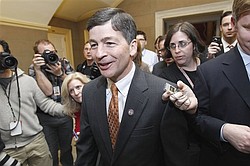Ill housing markets trump ideology for GOP
AP
In this April 8, 2011 file photo, Rep. Jeb Hensarling, R-Texas, is surrounded by reporters on Capitol Hill in Washington. Shutting down Fannie Mae and Freddie Mac should fit seamlessly into the Republican drive to shrink government. After all, it has cost taxpayers $150 billion to keep the ailing mortgage giants afloat and many in both parties would rather let the private sector handle their role in financing the nation’s $11.3 trillion residential mortgage market.
Associated Press
WASHINGTON
Shutting down Fannie Mae and Freddie Mac should fit seamlessly into the Republican drive to shrink government. After all, keeping the ailing mortgage giants afloat has cost taxpayers $150 billion and many in both parties want private lenders to finance a bigger share of the nation’s $11.3 trillion residential mortgage market.
But House and Senate Republicans pushing bills to phase out both federally run companies are learning how fear, politics and old-fashioned lobbying can trump ideology.
Even in the GOP-run House, leading proponents of doing away with Fannie and Freddie aren’t predicting victory. As a precaution, they’re advancing eight bills taking bite-sized swipes at the issue.
In the Democratic-led Senate, a sister measure by 2008 presidential candidate Sen. John McCain, R-Ariz., faces long odds, and the Banking Committee’s top Democrat and Republican are wary of quickly reshaping the market for financing home purchases.
“There’s no consensus on it,” House Financial Services Committee Chairman Spencer Bachus, R-Ala., conceded in an interview this month about a sweeping overhaul bill by Rep. Jeb Hensarling, R-Texas. “I can’t promise we will build consensus.”
Fannie and Freddie don’t issue mortgages but buy them from the original lenders, thus providing cash for more loans. They then package many mortgages into securities that they resell to investors, using a government guarantee that lets them pay a lower yield than their few competitors.
Bachus calls Hensarling’s bill “the gold standard” for Republicans. It would halt government backing of Fannie and Freddie and end or dramatically reduce their role in mortgage financing within five years.
The goal is to turn the mortgage market over to banks and other private lenders, who have shied away during the relentless real-estate bust of the past few years.
With housing still staggering from foreclosures and low prices, some Republicans worry that erasing the federal role in the mortgage market could rattle the housing industry and perhaps the entire economy.
Without the government guarantee of mortgage products that Fannie and Freddie enjoy, the cost of mortgages would likely rise, making homes less affordable.
“You can’t do that,” Rep. Gary Miller, R-Calif., a solid conservative and real-estate developer from just east of Los Angeles, says of proposals to end the federal role in financing mortgages. “It would devastate the housing market.”
Feeding lawmakers’ concerns are real-estate agents, mortgage bankers and home builders, powerful constituencies and campaign contributors.
The bankers and builders brought throngs of members to the Capitol last month to visit legislators, and the real-estate agents are coming in May.
“Every member of Congress has hundreds of them in their district, and they are very active,” Rep. John Campbell, R-Calif., another conservative who wants to maintain a federal role in financing homes, said of Realtors. “I would not discount their impact.”
Though Democrats, including President Barack Obama, agree that Fannie and Freddie should be eased aside to get private lenders back in the market, Republicans generally want to move faster and further.
 43
43

